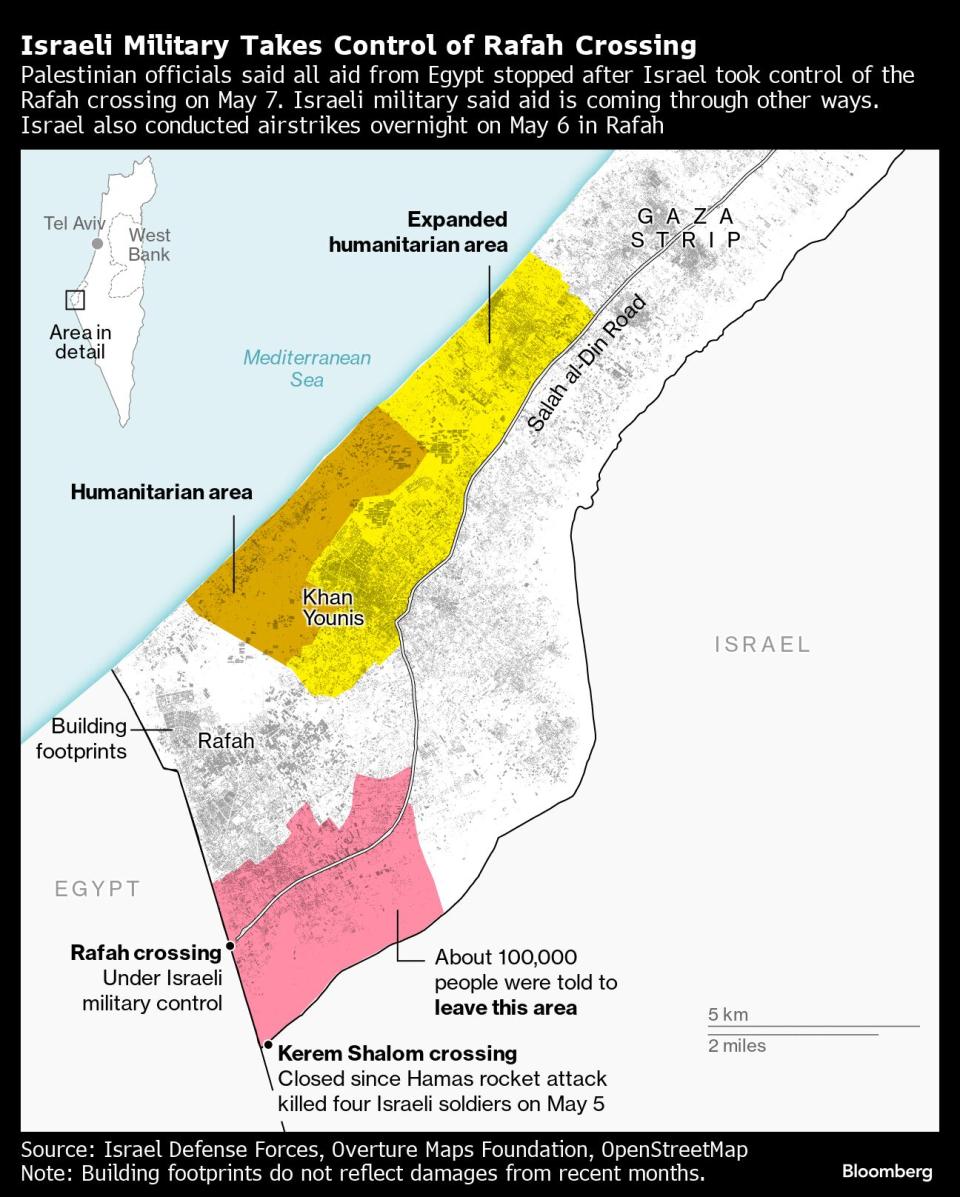Israel’s Troops Take Control of Rafah Border Crossing in Gaza
(Bloomberg) -- Israeli forces took control of the Rafah border-crossing in Gaza on Tuesday morning ahead of a possible assault on the city.
Most Read from Bloomberg
One Out of Every 24 New York City Residents Is Now a Millionaire
Trump’s Private Life Exposed in Intimate Stormy Daniels Testimony
It’s the first time Israel’s army has entered that part of Gaza since the war with Hamas, an Iran-backed militant group, began in October.
The development came a day after Israel told residents in parts of eastern Rafah to leave immediately and launched more airstrikes in some areas of the city. Prime Minister Benjamin Netanyahu has said civilians will be allowed to move out before any ground attack.
Cease-fire talks between the two sides continue but remain stuck over Hamas’s demand that any pause in fighting is effectively permanent. Israel says the war can’t end — even if there’s a break for a weeks-long truce — until Hamas surrenders or is crushed as a military and governing organization.
Palestinian officials said all aid flows from Egypt into Gaza had stopped after the Israel Defense Forces took over the Rafah crossing.
The army has halted “the movement of people and aid completely,” the Hamas-run border authority said in a statement. Tanks drove through the area in the far south of the Gaza Strip and soldiers replaced Palestinian flags with Israeli ones.
The IDF said it acted “following intelligence that indicated the Rafah crossing was being used for terrorist purposes.”
Hamas called it a “dangerous escalation against a civilian facility protected by international law.”
The border is the main entry point for aid into Gaza. Its closure follows the shutting of the nearby Kerem Shalom crossing between Israel and Gaza on Sunday after Hamas rockets killed four Israeli soldiers there.
The US has been urging Israel for weeks to allow more food and other supplies in, with the United Nations saying parts of the territory are on the verge of famine.
Israel says that, for now, 100,000 people fall under its “evacuation order” in eastern Rafah. One Israeli official said the operation will probably last around two weeks. It’s unclear if the military will try moving out people in other parts of Rafah, which could take longer.
More than 1.4 million people are sheltering in Rafah, most of them having fled from other areas of Gaza to seek shelter. Israel has largely defeated Hamas in the rest of the territory, but says around 5,000 to 8,000 fighters and senior leaders are in Rafah.
Israel also believes it’s the location of most of the remaining hostages held by Hamas, which is backed by Iran and designated a terrorist group by the US and European Union.
Most Arab and many European states have said Israel should not attack Rafah, fearing it would cause mass casualties. The US has expressed concerns too.
“Despite the request of the international community, the US, the EU — everybody asking Netanyahu not to attack Rafah — the attack started yesterday night,” Josep Borrell, the EU’s foreign policy chief, said in Brussels on Tuesday. “There are no safe zones in Gaza. Let’s see how we can try to mitigate the consequences of the situation.”
Egypt condemned “in the strongest terms” Israel’s takeover of the Gaza side of the border post. Saudi Arabia called for a cease-fire “to stop the genocide carried out by the occupation forces against defenseless civilians.”
On Monday night, Hamas said it had accepted a cease-fire proposal from mediators Egypt and Qatar. Israel rejected that, saying it contained demands not previously under discussion.
Qatar said it was sending a delegation to Cairo on Tuesday for the latest round of negotiations.
The war erupted when Hamas attacked southern Israel from Gaza on Oct. 7, killing 1,200 people and taking 250 hostage. Israel’s bombardment and ground attack on the Palestinian territory have killed almost 35,000 people, according to the Hamas-run health ministry.
The only truce so far lasted a week and ended on Dec. 1. Around half the hostages were released. Of those remaining, Israel thinks at least 30 are dead.
--With assistance from Omar Tamo, Kateryna Kadabashy, Alex Newman, Salma El Wardany and Katharina Rosskopf.
(Updates with comments from Hamas and IDF.)
Most Read from Bloomberg Businessweek
A New Kind of Power Company Will Put a Battery in Every Home
Boom Times Are Over for Food Startups, But That’s a Good Thing
Chris Dixon’s Campaign to Overhaul Crypto’s Grifty Reputation
©2024 Bloomberg L.P.




